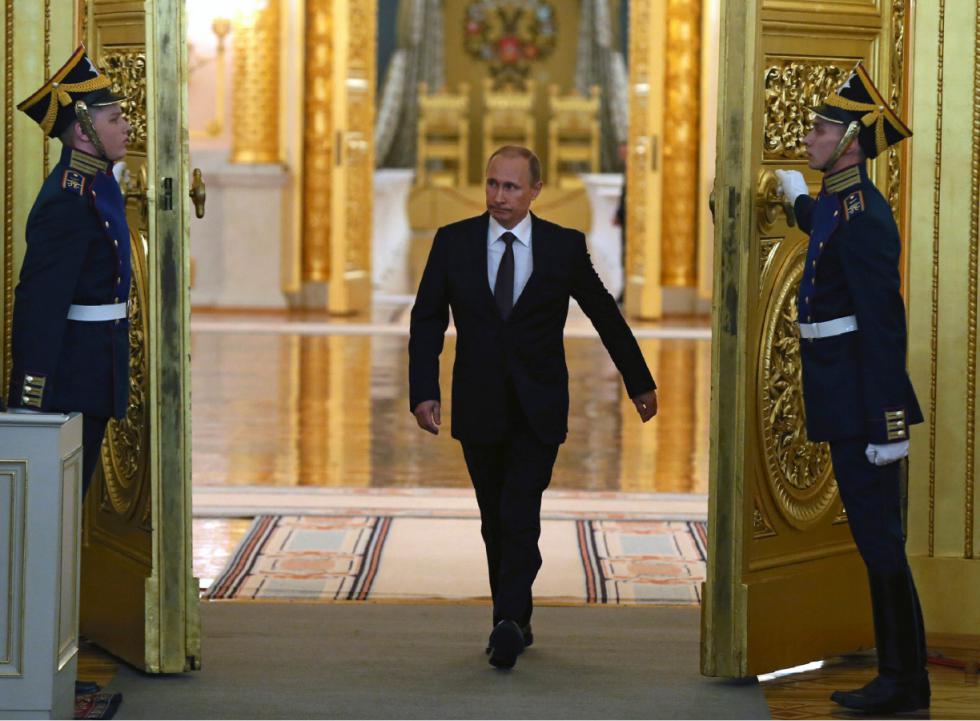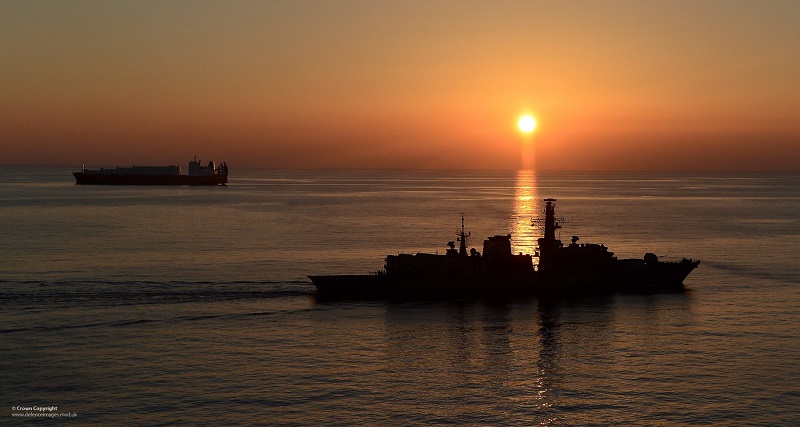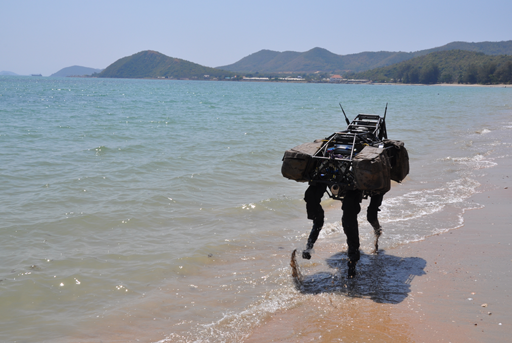The troubling developments in Ukraine have once again compelled observers to analyze Vladimir Putin’s intentions and respond in some way to his aggression. This article will draw on media reports and the analyses of experts on the region in order to provide an interpretation of Putin’s intentions and actions, both over the past years in his role as president and following Russia’s military incursion into Crimea and its formal absorption on March 21.
Background: Russia’s Resurgence under Putin
 It seems that President Vladimir Putin’s goal is to restore Russia’s position in the international system as a global superpower. Angela Stent notes that after the tumultuous years following the collapse of the Soviet Union, Russia has indeed reemerged on the world stage reinvigorated by the end of Putin’s first presidential term. Stent’s appraisal of Russia’s domestic political scene and its international standing following Putin’s first presidential term is that the country is defined by both ‘restorative’ and ‘revolutionary’ impulses. These seemingly diametrically opposed ideals can be observed both in substantive foreign policy (i.e. seeking to preserve the buffer states of both the outer Tsarist empire and the former constituent states of the Soviet Union) and in state symbolism (i.e. rehabilitating and fusing both Tsarist and Soviet images, readopting the melody of the Soviet anthem with new lyrics, etc.).
It seems that President Vladimir Putin’s goal is to restore Russia’s position in the international system as a global superpower. Angela Stent notes that after the tumultuous years following the collapse of the Soviet Union, Russia has indeed reemerged on the world stage reinvigorated by the end of Putin’s first presidential term. Stent’s appraisal of Russia’s domestic political scene and its international standing following Putin’s first presidential term is that the country is defined by both ‘restorative’ and ‘revolutionary’ impulses. These seemingly diametrically opposed ideals can be observed both in substantive foreign policy (i.e. seeking to preserve the buffer states of both the outer Tsarist empire and the former constituent states of the Soviet Union) and in state symbolism (i.e. rehabilitating and fusing both Tsarist and Soviet images, readopting the melody of the Soviet anthem with new lyrics, etc.).
The early years of Putin’s rule were marked by attempts to find common ground with the West. The most recent years have been marked by bellicosity, disagreement, and a failed ‘reset’ in relations, particularly between Russia and the United States. This state of relations is manifest in the form of Russia’s bitter criticism of US and NATO interventions in the Middle East, through armed conflict with Georgia in 2008, the crisis in Syria, and most recently, the annexation of Crimea. Putin has demonstrated that he is determined to protect Russian national interests as they have been conceived in terms of historical spheres of influence.
The clash of Western and Russian interests
Top Western officials, ranging from German Chancellor Angela Merkel to US Secretary of State John Kerry, have argued that Russia’s recent behaviour is highly irrational and verging on the anachronistic in terms of its goals and methods. In contrast, conservative American commentators and classical realists have interpreted Putin’s recent actions vis à vis Crimea to be exactly the opposite of the irrational.
“Russia’s concerns are sound from the realist perspective, as the loss of Ukraine and access to the Black Sea would seriously threaten security”
The classic realist paradigm would suggest that the US does not have core interests regarding Ukraine that are commensurate to those of Russia. As such, its potential options and political will are significantly limited. Russia has seen Ukraine, its neighbour and former client, pulled out of its orbit by the US-supported Kyiv government. Therefore the Russian response, they contend, is completely within the bounds of reason. After all, Ukraine has constituted a key strategic interest of Russia’s for centuries. Yet, is that enough to justify Russia’s gross acts of aggression and violations of international law? While a few may accept it as justification, most simply see through such rationale as existing ‘within the bounds of Putin’s reasoning.’ While it is true that it is utterly inconceivable for American troops to be deployed as a response to the regional crisis, the US should stand with other countries to defend the basic obligations outlined in the UN Charter, namely, that all Members must refrain from the use or threat of force in international relations and seek out other ways to respond effectively to Russia’s actions.
Russia’s options
 Vladimir Putin is an ethno-nationalist who perceives his mission as one ostensibly to protect Russian territory and ethnic Russians abroad (however they may be defined). He sees himself as ‘the gatherer of the Russian nation,’ which in his mind, was divided by the collapse of the Soviet Union. The tendentious, yet oft-repeated claim of protecting Russians in the ‘near abroad’ (read: the former Soviet Union) has served as a pretext for the violation of neighbouring states’ sovereignty and security in the past. Most recently, one can point to the massive cyber attacks launched against Estonia in 2007 as well as Russia’s brief war with Georgia in 2008 and persistent, illegal occupation of Abkhazia and South Ossetia as examples. Recent developments have not only indicated the US’ inability to accurately predict Putin’s intention, but also its miscalculation as to the speed with which the Kremlin is willing to exact its interests.
Vladimir Putin is an ethno-nationalist who perceives his mission as one ostensibly to protect Russian territory and ethnic Russians abroad (however they may be defined). He sees himself as ‘the gatherer of the Russian nation,’ which in his mind, was divided by the collapse of the Soviet Union. The tendentious, yet oft-repeated claim of protecting Russians in the ‘near abroad’ (read: the former Soviet Union) has served as a pretext for the violation of neighbouring states’ sovereignty and security in the past. Most recently, one can point to the massive cyber attacks launched against Estonia in 2007 as well as Russia’s brief war with Georgia in 2008 and persistent, illegal occupation of Abkhazia and South Ossetia as examples. Recent developments have not only indicated the US’ inability to accurately predict Putin’s intention, but also its miscalculation as to the speed with which the Kremlin is willing to exact its interests.
It is true that, despite the illegality of Crimea’s annexation, the peninsula does indeed represent a key historical and strategic Russian interest. (However, its historical interest does not go as far back as those sympathetic to the Russian view like to imply). This is not even mentioning the anxiety caused by the NATO encroachments into post-communist space. The Kremlin considers the fall of their puppet, Yanukovych, and the assumption of power by the new Kyiv government to be a major blow to its strategic interests.
On March 25, President Barack Obama interpreted Russia’s most recent act of aggression as a display of weakness and insecurity, rather than strength. If Obama is correct, then these Western incursions into former communist territories must not be underestimated insofar as they serve as important factors that temper President Putin’s behaviour in the region.
Ultimately, Russia’s concerns are sound from the realist perspective, as the loss of Ukraine and access to the Black Sea would seriously threaten security, which, for historical reasons, are defined and measured primarily in geographic terms. Putin’s presidency can certainly be interpreted as a retrenchment of Russia’s historic national interests and at least its partial restoration as a leading power, both globally and especially regionally.
George Friedman, chairman of Stratford, highlights that Moscow views its security primarily through the lens of geography, and as such, the incursion into post-Soviet space by NATO and the EU in recent decades have been cause for much concern.
Friedman enumerates four options for Russia in the future:
1) Russia can do nothing and allow for political stalemate to emerge in Ukraine
2) Putin can continue his invasion into mainland Ukraine (although this may actually strength the cause of Ukrainian nationalists to his detriment)
3) Russia can engage in ‘commercial imperialism,’ that is, exploiting the economic weakness of the EU and woo states like Bulgaria, Romania, and Hungary.
4) Finally, Russia could threaten to act as a spoiler in other key international crises, such as the ongoing nuclear negotiations with Iran or the Syria civil war.
The West’s response
The prominent Russian dissidents and inveterate opponents of Putin, Alexei Navalny and Garry Kasparov, have observed that the West is playing by a rulebook that Putin very brazenly tore up long ago. This is what Kasparov, an International Grandmaster of chess-turned-dissident, sees as the crux of the issue of how the West should respond to Putin’s aggression and flagrant disregard for the sovereignty of Russia’s neighbours. If the West is to take one point away from Kasparov, it is that it is impossible to deal with Putin on a mutually beneficial level, as he only conceives of exchanges in terms of a zero-sum and Machiavellian self-interest. The US and the EU should take note of Alexei Navalny’s recommendations to apply even more stringent, strategically levered sanctions against Putin and his inner circle, and to implement these recommendations.




